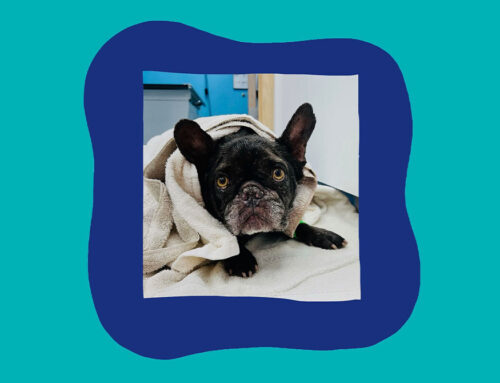Did you know that summertime is flu season for dogs? Or that parvovirus is more common in warm weather? Summer is a great time to review your dog and cat’s vaccines to make sure they’re fully protected while they play.
Who needs what?
Vaccinations prevent infectious diseases. We carefully select vaccines that are safe, painless, and effective to provide your dog and cat with the best protection with the least risk of side effects. Vaccinations are divided into two categories by the American Animal Hospital Association (AAHA) and the American Association of Feline Practitioners (AAFP): core and noncore. Core vaccinations are for every pet. Noncore vaccinations are selected based on what diseases are present in your area and your pet’s individual risk factors and lifestyle.
Core Vaccines for Dogs
- Distemper, adenovirus, parvovirus (DAP)
- Rabies
Noncore Vaccines for Dogs
- Bordetella bronchiseptica, parainfluenza (kennel cough)
- Canine influenza virus H3N2 and H3N8 (dog flu)
- Leptospira (leptospirosis)
- Borrelia burgdorferi (Lyme disease)
- Crotalus atrox (rattlesnake venom)
Core Vaccines for Cats
- Feline herpesvirus-1, feline calicivirus, and feline panleukopenia (Fvrcp)
- Rabies where required by law (like here in the tri-state area)
Noncore Vaccines for Cats
- Feline leukemia virus (AAFP recommends every kitten receive a series of 2 boosters as a kitten and another 1 year later)
- Feline immunodeficiency virus (FIV)
- Chlamydophila felis
- Bordetella bronchiseptica
- Feline infectious peritonitis (FIP)
How to decide which noncore vaccines your dog needs:
Social dogs should be protected against kennel cough and dog flu. That includes dogs who go to day care, dog parks, grooming, or boarding facilities. It also includes dogs who may come into contact with friends on neighborhood walks. We’ve had 2 outbreaks of flu here in Cincinnati, and several boarding facilities even had to close temporarily to stop the spread. Both flu and kennel cough are airborne. They are spread by sneezing and nasal discharge.
Here in Cincinnati, we strongly recommend that all dogs be protected against leptospirosis because our local raccoon and opossum populations are carriers of the bacteria. The bacteria are hardy in moist conditions, so all it takes to get infected is for a raccoon to pee in your yard and your dog to sniff/lick the area. Then the bacteria multiply and cause damage to the liver and kidneys. Even more scary is that leptospirosis is contagious to people, so you are at risk if you come into contact with your sick pet’s urine.
Lyme disease vaccination is not usually needed for dogs who stay in Cincinnati as long as they are on year-round tick prevention. That may change in the future, however, as our tick population becomes more infected with the bacteria and the risk for the disease increases. Dogs who are not protected against ticks or who travel to the northeast or northern midwest should be vaccinated.

Which noncore vaccines does my cat need?

Cats who go outside where they may come into contact with other cats should be protected against FelV (Feline leukemia virus). That virus is spread through saliva, so sharing a water dish, mutual grooming, or fighting can lead to virus transmission. The virus can lead to a supressed immune system and even the development of certain cancers like lymphoma.
Cats who live with an FIV-infected cat can receive the FIV vaccine. This virus is transmitted from cat to cat by biting. Only cats who are microchipped should receive this vaccine, because it will cause the cat to test positive for the disease on the screening tests used in most veterinary offices. So if your cat ever gets lost, he or she might be mistakenly diagnosed with the disease and considered sick and contagious. FIV causes immunosuppression, making your cat more susceptible to infections.
Chlamydophila, Bordetella, and FIP vaccinations are rarely needed for cats in the Cincinnati area.








Leave A Comment